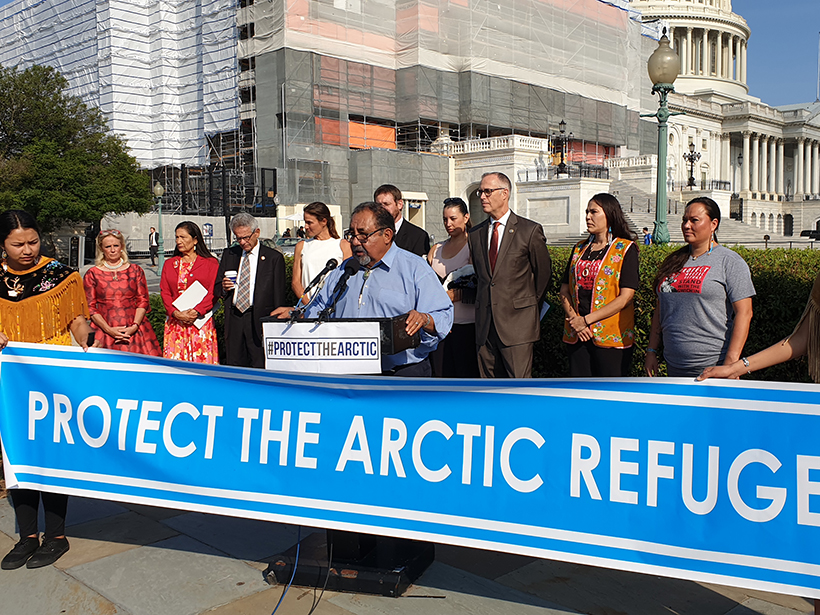A measure to protect the Arctic National Wildlife Refuge (ANWR) moved forward on 12 September with the Democratically controlled House of Representatives voting 225–193 in favor of keeping oil and gas development out of the large coastal plain area of this vast protected region in northeast Alaska. However, the measure faces stiff opposition in the Republican-controlled Senate.
The Arctic Cultural and Coastal Plain Protection Act would repeal the Arctic National Wildlife Refuge oil and gas program currently included in the 2017 Tax Cuts and Jobs Act (Public Law 115–97). The tax act calls for the secretary of the Department of the Interior (DOI) to establish and administer a program for leasing, developing, producing, and transporting oil and gas in and from Alaska’s coastal plain, which is referred to as area 1002. The 1.5-million-acre area 1002 is part of the 19.6-million-acre refuge, the largest national wildlife refuge in the country. Area 1002, which the indigenous Gwich’in refer to as “the sacred place where life begins,” is a habitat for porcupine caribou and many other species.
“We’re striking back this week to the Trump administration and their philosophy of drill everywhere every time with no exception.”
Natural Resources Committee chair Rep. Raúl Grijalva (D-Ariz.) and other advocates for protecting ANWR said that the oil and gas program was slipped into the 2017 legislation, and they are determined to repeal it.
“We’re striking back this week to the Trump administration and their philosophy of drill everywhere every time with no exception,” Grijalva said at an 11 September briefing on Capitol Hill in advance of the House vote about ANWR and also prior to two separate votes to ban offshore oil drilling that the House approved on 11 September.
Grijalva said that the House vote to protect the refuge would set down a marker “to reverse the gross injustice that was forced down the throat of the American people by the Republican Congress two years ago and by this administration.”
“Righting the Wrong of the Republican Tax Scam”
Rep. Jared Huffman (D-Calif.), who introduced the bill to protect the refuge, said that House support for the measure “represents a high water mark in our efforts to protect this very special place.” Huffman, who chairs the Natural Resources Subcommittee on Water, Oceans, and Wildlife, said the bill is “about righting the wrong of the Republican tax scam.”
Huffman also denounced what he said is “the corrupted nature” of the Interior Department and the revolving door between the department and the oil and gas industry. In August, for instance, DOI official Joe Balash, who formerly oversaw oil and gas drilling on federal lands and had favored opening ANWR to oil leasing, resigned to take a position working for a foreign oil company that is advancing an oil development project on Alaska’s North Slope.
“This administration is a wholly owned subsidiary of the oil and gas industry.”
“Make no mistake: this administration is a wholly owned subsidiary of the oil and gas industry,” Huffman said. “You might say, ‘That’s hyperbole, that’s an exaggeration.’ And I will grant you that there are also some mining and coal interests that have minority stakes in the Department of Interior these days, but it is mostly big oil that wags the dog of this disgraceful Department of Interior.”
“This administration really thinks that it owns everything and that it can just sell off our public lands or our tribal lands to the highest bidder, and we are trying to stop that,” said Rep. Deb Haaland (D-N.M.), chair of the Natural Resources Subcommittee on National Parks, Forests, and Public Lands.
Huffman added that “there is a bigger picture” to bear in mind. “We know that President Trump and his cronies are attacking science at every turn with Sharpies,” he said, referring to Trump allegedly modifying a National Oceanic and Atmospheric Administration weather map with a magic marker to inaccurately extend the reach of Hurricane Dorian’s impact. “We know that they are threatening reprisals against federal scientists who are just trying to do their job. We know that they are embarrassing us on the world stage with their climate denial, obviously.”
A Tough Sell in the Senate
Huffman and others acknowledged that passage of ANWR protections in the Senate will be a difficult fight. Six Democrats, however, did introduce the Arctic Refuge Protection Act on 11 September. That bill would designate the refuge’s coastal plain as wilderness under the National Wilderness Preservation System.
“We should not have to trade our culture for oil and gas.”
“Republicans in the Senate and in this administration need to know that they are deeply on the wrong side of the American people and of history on this issue,” Huffman said. He added that many Republican senators voted for the provision in the tax act to establish an oil and gas program in the ANWR. “They are going to be held accountable for that.”
“It’s going to be harder in the Senate” to pass the bill, said Bernadette Demientieff, executive director of the Gwich’in Steering Committee. “But we’re not giving up. We just can’t. We don’t have a choice but to continue to come down here and educate our senators.”
She added, “We should not have to trade our culture for oil and gas.”
—Randy Showstack (@RandyShowstack), Staff Writer
Citation:
Showstack, R. (2019), House passes measure to protect Arctic National Wildlife Refuge, Eos, 100, https://doi.org/10.1029/2019EO133149. Published on 12 September 2019.
Text © 2019. AGU. CC BY-NC-ND 3.0
Except where otherwise noted, images are subject to copyright. Any reuse without express permission from the copyright owner is prohibited.

